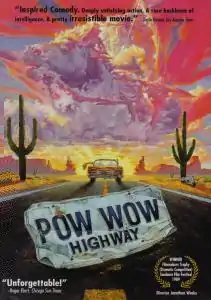Powwow Highway
Powwow Highway is a 1989 comedy-drama road movie directed by Jonathan Wacks. Based on the novel Powwow Highway by David Seals, it features A Martinez, Gary Farmer, Joanelle Romero and Amanda Wyss. Wes Studi and Graham Greene, who were relatively unknown actors at the time, have small supporting roles.
| Powwow Highway | |
|---|---|
 DVD cover art | |
| Directed by | Jonathan Wacks |
| Produced by | Jan Wieringa George Harrison Denis O'Brien |
| Written by | David Seals Janet Heaney Jean Stawarz |
| Starring | |
| Music by | Barry Goldberg |
| Cinematography | Toyomichi Kurita |
| Edited by | Jim Stewart |
Production company | |
| Distributed by | Warner Bros |
Release date |
|
Running time | 87 minutes |
| Country | United States |
| Language | English |
Plot
A member of the Northern Cheyenne tribe of Lame Deer, Montana, Buddy Red Bow (Martinez), a quick-tempered activist, is battling greedy developers. On the Northern Cheyenne Indian Reservation he tries to persuade the council to vote against a strip-mining contract.
Philbert Bono (Farmer) is a hulk of a man guided by sacred visions. He wants to find his medicine, and gather tokens from the spirits. He trades some marijuana for his "war pony" – a rusted out, beat up 1964 Buick Wildcat he names "Protector."
Meanwhile, Buddy's estranged sister, Bonnie, is arrested in Santa Fe, New Mexico and Buddy is the only family member who can help her and her children, Jane and Sky Red Bow.
Buddy does not own a car, but needs to get to his sister. His childhood acquaintance Philbert offers him a ride in his rundown car. In their childhood, Buddy found Philbert awkward and embarrassing, and Philbert was bullied for being fat. Buddy's attitude towards Philbert had not changed very much, but he needs a ride.
They set out on their road trip, and Philbert's easygoing ways and insistence on frequent stops to pray and eat prove irritating at first to Buddy, and the men argue. But along the way, they meet with friends in other communities, attend a Pow wow at Pine Ridge Indian Reservation where Buddy dances with other veterans, and visit the sacred Black Hills in South Dakota where Philbert reverently leaves a giant Hershey's chocolate bar as an offering to his ancestors. Eventually Buddy joins Philbert in praying and singing to the ancestors in a river. Gradually, the men grow to appreciate and respect one another.
When they finally reach Santa Fe, they meet up with Bonnie's friend Rabbit. Philbert receives inspiration in a glimpse of a scene from an old western on TV, and breaks Bonnie out of jail. Their escape almost ends in tragedy, but with a little help they make their way back to Montana.
Music
Several songs by Robbie Robertson, from his 1987 solo album, accompany scenes in the film.
Box office and critical reception
Powwow Highway did poorly at the box office, grossing a mere $283,747, despite mostly positive reviews.
Roger Ebert called Gary Farmer's performance "...one of the most wholly convincing I’ve seen..." Booklist called the sequel novel Sweet Medicine, by David Seals, "a comic masterpiece."[1] In Sweet Medicine, the characters complain about how they were portrayed in the film, and pass on seeing it when they have the chance.
Awards
- Won
- Sundance Film Festival – Filmmakers Trophy – Dramatic (Jonathan Wacks)
- Native American Film Festival – Best Picture (Jan Wieringa, George Harrison & Denis O'Brien)
- Native American Film Festival – Best Director (Jonathan Wacks)
- Native American Film Festival – Best Actor (A Martinez)
- Nominated
- Sundance Film Festival – Grand Jury Prize (Jonathan Wacks)
- Independent Spirit Awards – Best First Feature (Jan Wieringa, Jonathan Wacks, George Harrison & Denis O'Brien)
- Independent Spirit Awards – Best Supporting Male (Gary Farmer)
- Independent Spirit Awards – Best Cinematography (Toyomichi Kurita)
References
- Booklist, Oct. 1992, American Library Association. Reviewed Sept. 15, 1992 by Ray Olson